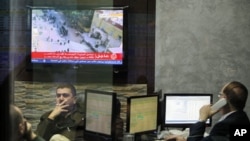Egypt's economy has all but ground to a halt, with banks closed, the country's credit ranking cut and international corporations and retailers sharply curtailing their operations.
The Central Bank of Egypt refused Tuesday for the third consecutive business day to allow state and commercial banks to open for fear they might be looted. Most automatic teller machines are empty of cash.
The financial chaos has escalated as protests continue against the 30-year rule of President Hosni Mubarak. Egyptians cannot get the state benefits and paychecks they normally receive in the first week of each month.
The Standard & Poor's financial services firm cut Egypt's credit rating one notch, from BB+ to BB. The ratings company warned that it could downgrade Egypt's standing even further within the next three months. In recent days, two other credit rating firms also downgraded Egypt's standing, with Moody's rating the country's bonds as "junk," and Fitch lowering its Egyptian outlook from "stable" to "negative."
Meanwhile, such international employers in Egypt as U.S. companies Coca-Cola and General Motors, Germany's Volkswagen and the Dutch shopping and oil company A.P. Moller-Maersk, curtailed their Egyptian operations or pulled out of the country, at least for the time being.
Financial analysts have voiced the fear that the economic turmoil in Egypt could have a much broader international impact.
View the slide show of protests in Egypt
Oil prices on Monday reached a three-year high and investors sold off stocks and bonds of emerging economies, particularly those in the Mideast. So far, however, the Suez Canal, Egypt's key shipping channel, has remained open.
Investors had felt comfortable with the country's former finance minister, Youssef Boutros Ghali, who was credited with implementing economic reforms even as he was blamed in Egypt for unemployment that is likely above 20 percent. The investors say they are more skeptical of the new finance minister, Samir Radwan, despite his professed understanding of the protesters' grievances.
One analyst said Radwan's comments would not calm Egyptian economic worries and that they think the government of Mr. Mubarak may soon collapse.
Some information for this report was provided by AP.




